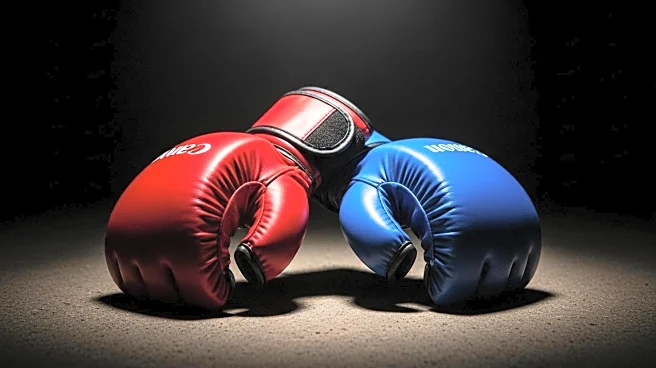What's Happening?
Azerbaijani UFC fighter Rafael Fiziev has announced his withdrawal from an upcoming fight against Brazilian Charles Oliveira due to a knee injury. Fiziev revealed that while the injury does not require surgery, it prevents him from performing at full capacity, including training, wrestling, and boxing. As a result, Polish fighter Mateusz Gamrot will step in to replace Fiziev on short notice. The fight between Oliveira and Gamrot is scheduled to take place on October 12 at UFC Fight Night 261 in Rio de Janeiro, Brazil. Fiziev's last fight was in June at UFC on ABC 8, where he secured a unanimous decision victory over Ignacio Bahamondes, bringing his record to 13 wins and 4 losses.
Why It's Important?
Fiziev's withdrawal from the fight against Oliveira is significant as it impacts the dynamics of the UFC Fight Night 261 event. The replacement of Fiziev with Gamrot introduces a new challenge for Oliveira, who must now prepare for a different opponent with potentially different fighting styles and strategies. This change could affect the betting odds and fan expectations for the fight. Additionally, Fiziev's injury highlights the physical demands and risks associated with professional mixed martial arts, where injuries can abruptly alter career trajectories and event outcomes. The situation underscores the importance of athlete health and recovery in the sport.
What's Next?
With Mateusz Gamrot stepping in to fight Charles Oliveira, both fighters will need to adjust their strategies and training regimens to prepare for the new matchup. Oliveira, who was originally preparing for Fiziev, will have to quickly adapt to Gamrot's fighting style. Meanwhile, Fiziev will focus on recovering from his knee injury, which he estimates will take several months before he can return to competition. The UFC and fans will be watching closely to see how the new matchup unfolds and how Fiziev's recovery progresses.
Beyond the Headlines
Fiziev's injury and subsequent withdrawal from the fight bring attention to the broader issue of athlete health and safety in combat sports. The physical toll of training and competition can lead to injuries that not only affect individual careers but also the scheduling and outcomes of major sporting events. This situation may prompt discussions within the UFC and other sports organizations about improving support systems for injured athletes, including medical care and recovery protocols.








